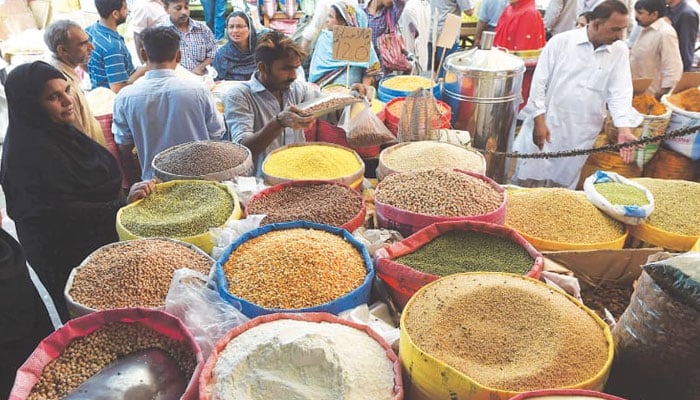Food inflation hits rain-weary Pakistanis hard
Weekly inflation rose 3.35 percent week-on-week and 42.31 percent year-on-year, over a decade high, dashing hopes of the masses about achieving financial stability in the near-term
KARACHI: Driven by higher food, petrol and electricity prices, weekly inflation rose 3.35 percent week-on-week and 42.31 percent year-on-year, over a decade high, dashing hopes of the masses about achieving financial stability in the near-term.
Data issued by the Pakistan Bureau of Statistics (PBS) on Friday said increase in the sensitive price indicator (SPI) was mainly because of spike in prices of tomato (20.28 percent), chicken (7.57 percent), electricity for q1 (6.83 percent), petrol (2.96 percent), onion (2.30 percent), powdered milk (2.03 percent), cigarette (1.69 percent), eggs (1.63 percent), pulse moong (1.42 percent) and potatoes (1.07 percent).
The massive increase of 42.31 percent in annualised SPI was slammed by the opposition. Muzammil Aslam, PTI spokesperson on economy and finance, tweeted that SPI crossed 40 percent for the first time in Pakistan’s history. Last week, according to the Bureau of Statistics, Pakistanis saw 42.31 percent increase in inflation compared to the same period last year, he added.
SPI comprises 51 essential items collected from 50 markets in 17 cities of the country. During the week, out of 51 items, prices of 25 (49.01 percent) items increased, 11 (21.57 percent) items decreased, and 15 (29.42 percent) items remained stable.
Fahad Rauf, head of research at Ismail Iqbal Securities, said the SPI jumped by 3.35 percent WoW mainly because of increase in electricity, petrol, tomato and chicken prices during the week.
Electricity price adjustments would likely continue due to planned base tariff hikes and expected higher fuel price adjustments. “We expect inflation to peak in August 2022 around 27 percent due to low base effect and energy price adjustment,” he added.
With broad rises in prices across the country, further fuelled by the devastating rains in lower Punjab, Balochistan, and Sindh, inflation rate has been accelerating at a greater pace, highlighting the difficulties faced by the coalition government in controlling this menace. Inflation was one of the reasons former prime minister Imran Khan had to face a vote of no-confidence.
Shaukat Tarin, former federal minister for finance and revenue, said, “This government came to reduce inflation. In end March, SPI was 17 percent and now it has exceeded 42 percent. The people of Pakistan are paying a very heavy price for this experiment which has gone wrong.”
Topine Securities in its note said the increase in SPI was “over a decade high”. The massive increase in SPI has impacted all expenditure groups; divided in five quintiles by the PBS. For the groups spending up to Rs17,732; Rs17,733-22,888; Rs22,889-29,517; Rs29,518-44,175; and above Rs44,175; YoY SPI increased 34.24, 40.43, 39.37, 39.54, and 43.30 percent, respectively. On WoW basis, the change for the groups was 1.8, 2.25, 3.03, 3.19, and 3.94 percent, respectively.
Different weightages are assigned to various commodities in the SPI basket. Commodities with the highest weights for the lowest quintile include milk (17.5449 percent), electricity (8.3627 percent), wheat flour (6.1372 percent), sugar (5.1148 percent), firewood (5.0183 percent), long cloth (4.2221 percent), and vegetable ghee (3.2833 percent).
Of these commodities, prices of electricity, wheat flour and long cloth increased, while the prices of sugar, firewood, vegetable ghee and unpackaged milk declined. However, the prices of all commodities spiked higher on YoY basis except for refined sugar, which shed 16.55 percent.
-
 Kylie Kelce Reveals Rules She Wants Daughter Bennett To Learn At 3: No More 'passies'
Kylie Kelce Reveals Rules She Wants Daughter Bennett To Learn At 3: No More 'passies' -
 Smartphone Market Set For Biggest-ever Decline In 2026
Smartphone Market Set For Biggest-ever Decline In 2026 -
 Mud, Rain, Loincloths: All About Japan’s 200-year-old Harvest Wrestling Ritual
Mud, Rain, Loincloths: All About Japan’s 200-year-old Harvest Wrestling Ritual -
 Jonathan Majors Set To Make Explosive Comeback To Acting After 2023 Conviction
Jonathan Majors Set To Make Explosive Comeback To Acting After 2023 Conviction -
 Next James Bond: Why Jacob Elordi May Never Get 007 Role?
Next James Bond: Why Jacob Elordi May Never Get 007 Role? -
 Maddox Drops Pitt From Surname In Credits Of Angelina Jolie’s New Film 'Couture' Despite Truce From Father's End In Legal Battle
Maddox Drops Pitt From Surname In Credits Of Angelina Jolie’s New Film 'Couture' Despite Truce From Father's End In Legal Battle -
 Meghan Markle Adds Diamonds To Engagement Ring For Jordan Trip
Meghan Markle Adds Diamonds To Engagement Ring For Jordan Trip -
 Burger King Launches AI Chatbot To Track Employee Politeness
Burger King Launches AI Chatbot To Track Employee Politeness -
 Andrew’s Woes Amid King Charles’ Cancer Battle Triggers Harry Into Action For ‘stiff Upper Lip’ Type Dad
Andrew’s Woes Amid King Charles’ Cancer Battle Triggers Harry Into Action For ‘stiff Upper Lip’ Type Dad -
 Experts Warn Andrew’s Legal Troubles In UK Could Be Far From Over
Experts Warn Andrew’s Legal Troubles In UK Could Be Far From Over -
 Teyana Taylor Reflects On Dreams Turning Into Reality Amid Major Score
Teyana Taylor Reflects On Dreams Turning Into Reality Amid Major Score -
 Jennifer Garner Drops Parenting Truth Bomb On Teens With Kylie Kelce: 'They're Amazing'
Jennifer Garner Drops Parenting Truth Bomb On Teens With Kylie Kelce: 'They're Amazing' -
 AI Is Creating More Security Problems Than It Solves, Report Warns
AI Is Creating More Security Problems Than It Solves, Report Warns -
 'Game Of Thrones' Prequel 'A Knight Of The Seven Kingdoms' New Ratings Mark Huge Milestone
'Game Of Thrones' Prequel 'A Knight Of The Seven Kingdoms' New Ratings Mark Huge Milestone -
 Apple Seeks To Dismiss Fraud Suit Over Siri AI, Epic Injunction
Apple Seeks To Dismiss Fraud Suit Over Siri AI, Epic Injunction -
 Delroy Lindo Explains The Crucial Role Of Musical Arts In Setting Up His Career Trajectory
Delroy Lindo Explains The Crucial Role Of Musical Arts In Setting Up His Career Trajectory




